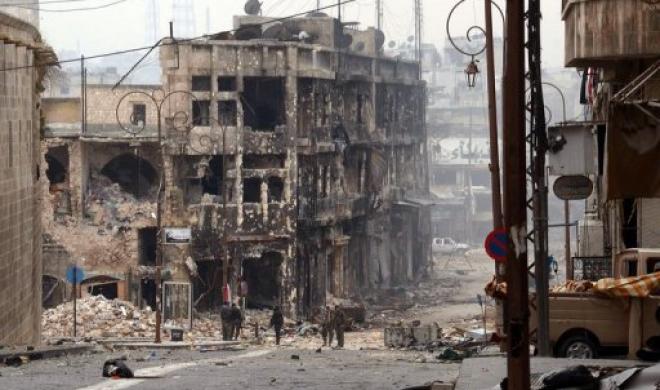Coinciding with military battles which have established a new map of control in the city of Aleppo, the regime is entering into an economic battle no less important, with the aim of reducing the fears which have prevented the return of businessmen to the city. Economists meanwhile doubt that all the regime’s efforts which aim to restore the city’s economic luster will succeed, pointing to the absence of the “security” factor — the most important for attracting investment.
Although, among the most important changes which could help serve the regime is the reopening of the Aleppo international airport, after government forces and allied foreign militias took control of the areas around the airport road in the eastern districts of Aleppo, prompting a handful of investors loyal to the regime who had left the country in 2012 to express their intention to return.
Talal Attar, a Syrian investor living in Egypt, said days ago that the organization of the “Aleppo Journey” project aims to gather the largest possible number of investors and industrialists to visit the city. Regime media quoted Attar, who owns a chain of restaurants in Aleppo, as saying, “I started the initiative because I knew how much Aleppo’s traders long for their city.”
Before Attar’s proposal, Syrian Prime Minister Imad Khamis said that his government was ready to offer the needed facilities to create a qualitative jump in the city’s economy. During his meeting with members of the Aleppo chamber of conferences days ago, he stressed the importance of containing the damage to factories in the city and the industrial city in Sheikh Zayed.
The economic researcher Munzer Mohamed compared the regime’s efforts to restore industrial and commercial activity to the city of Aleppo to “blowing into a punctured balloon.” He said, “We are talking about a city which businesspeople have fled from, never to return, especially given that the war has not ended yet.”
Mohamed added, in comments to Sada al-Sham: “The regime’s experience in this city has proven its failure. Since taking control of the Sheikh Zayed industrial city in July 2014, it has not yet succeeded in mobilizing production —not even five percent of what it was before the revolution.”
Regarding the industrial city’s current situation, Mohamed said that the regime spoke about its success in returning 225 factories to work out of an original of more than 2,000 factories which were present in 2011. He said: “We should actually be talking about small workshops which continued their work. The big factories have been shut down since the start of the revolution.”
Syrian investors will be hard to convince to return to Aleppo, primarily due to the lack of preliminary and logistic elements to mobilize domestic production, in addition to the success of the neighboring countries in attracting Syrian businessmen and industrialists by giving them the necessary facilitations.
A Syrian industrialist in Turkey that Mohamed approached agreed — he told Sada al-Sham that he would not not return to his active work in Aleppo city, unless the regime announced it had taken total control of the city, including the countryside.
Regarding the reasons for that, the industrialist, who asked not to be named, explained fear over the regime’s confiscation of a plastic goods factory he had owned in the industrial city in Sheikh Najar, saying: “I set up my new work here in the Turkish city of Gaziantep, and have started to export goods to importers in the Kurdistan region in Iraq, and the work is proceeding at a good rate — so why should I go back there?”
This manufacturer pointed to the lack of primary components to mobilize production domestically, including electricity, basic goods, fuel, and transport. He believes that Syria’s neighbors have succeeded in attracting Syrian capital through the assistance they have offered them. Based on that, he said that the great majority of Syrian investors were not planning to return for at least a decade.
But from another angle, the industrialist did not rule out some small capital owners returning to Aleppo because “they failed to obtain some of the privileges that neighboring countries gave to big investors.” He said that many small business owners in Turkey had not succeeded in finding a foothold in a large economic market which differs structurally from its Syrian counterpart.
At the same time, the economic researcher Mahmoud Nasser ridiculed the regime’s calls aiming to contain the economic crisis in Aleppo, pointing to the large movement of factories and workshops to the regime loyalist cities of the coast.
He added: “If the regime wants to reinvigorate production as it claims, that does not require more than returning the traders and manufacturers in the cities of Tartous and Lattakia to Aleppo.”
This article was translated and edited by The Syrian Observer. Responsibility for the information and views set out in this article lies entirely with the author.


